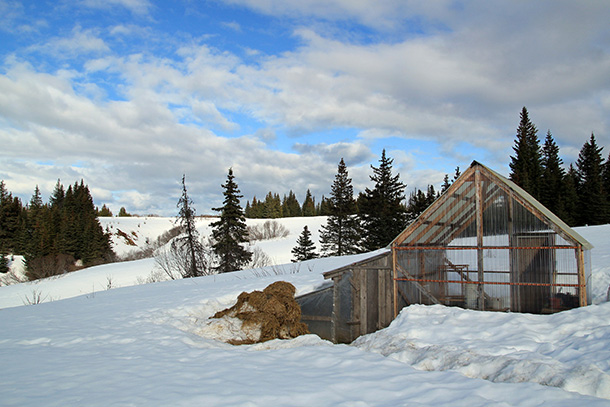
Poverty and other socioeconomic conditions have led to food, energy and water insecurities in remote Alaskan communities. Credit: mscornelius/iStock
Researcher to study food, energy and water security in rural Alaska communities
September 6, 2022
By Mary Fetzer
UNIVERSITY PARK, Pa. — An interdisciplinary team of Penn State researchers, funded by a two-year, $200,000 grant from the National Science Foundation, will travel to Alaska to study the vulnerable populations, critical infrastructure, built environment and social factors that affect food, energy and water (FEW) security and resilience.
Somayeh Asadi, associate professor of architectural engineering, will conduct the study in tandem with Guangqing Chi, professor of rural sociology, demography and public health sciences in the College of Agricultural Sciences, and Megan Mucioki, assistant research professor in the Social Science Research Institute. The planning grant is a first but important step in gathering community-based data to understand and improve FEW security in Alaska and other Arctic regions.
“This project is another example of Penn State architectural engineering faculty working on furthering our understanding and, as a result, our ability to leverage interdependencies between infrastructure systems,” said Sez Atamturktur Russcher, Harry and Arlene Schell Professor and head of the Department of Architectural Engineering. “Our undergraduate and graduate education as well as our research efforts focus on furthering systems thinking in the built environment.”
A community’s FEW security is impacted by availability — how much of the resource exists?; accessibility — can people obtain what is available?; suitability — is the resource what people want?; and reliability — can people count on the resource? Socioeconomic conditions, which in rural Alaska include poverty and limited infrastructure, also affect FEW security.
“Because FEW are highly reliant on one another, problems in one area impact the others,” Asadi said. “We need water and energy to grow food, energy to supply and treat water and water to generate electricity.”
Asadi said that COVID has worsened issues of food and energy access and affordability.
“FEW insecurity is linked with other systems of inequality that contribute to household vulnerability, and this can get worse during a disaster such as a pandemic,” she said. “COVID revealed that the burden of food, energy and water insecurity is disproportionately high among Alaskan households in remote communities.”
Incorporating perspectives from the social sciences, which highlight issues such as inequality, race and gender, can inform current discussions and future innovations to address FEW insecurity.
The researchers will meet with community-based partners —tribe administrators, school officials, farmers and fishermen — both virtually and in person. Through discussions, workshops and interviews, the researchers aim to establish an advisory board, build trust and discuss local challenges.
“This project demonstrates a successful example of productive collaborations between engineers and social scientists, which are essential to tackle critical social and infrastructure problems,” Chi said.
A child’s perspective is also important, according to Asadi. The researchers will sit down with children ages six to nine in Alaska to gain an understanding of their perceptions of FEW security. The responses will be compared with those from children who live near Penn State’s University Park Campus.
These information-gathering activities are a first step in developing community-driven, place-based resolutions to FEW insecurity. They will inform a place-based matrix of challenges and solutions to be distributed throughout the village and which will continue to be refined with community input. The final matrix will be the basis for a community-centered research proposal that begins to address the most important FEW concerns in remote Alaska.
“This is a great opportunity for all team members to get to know the collaborating community and identify their specific FEW challenges,” Mucioki said. “We hope this approach will generate future research and outreach from both engineering and social science perspectives, which will make a positive impact on FEW needs and resilience in rural villages in Alaska.”



